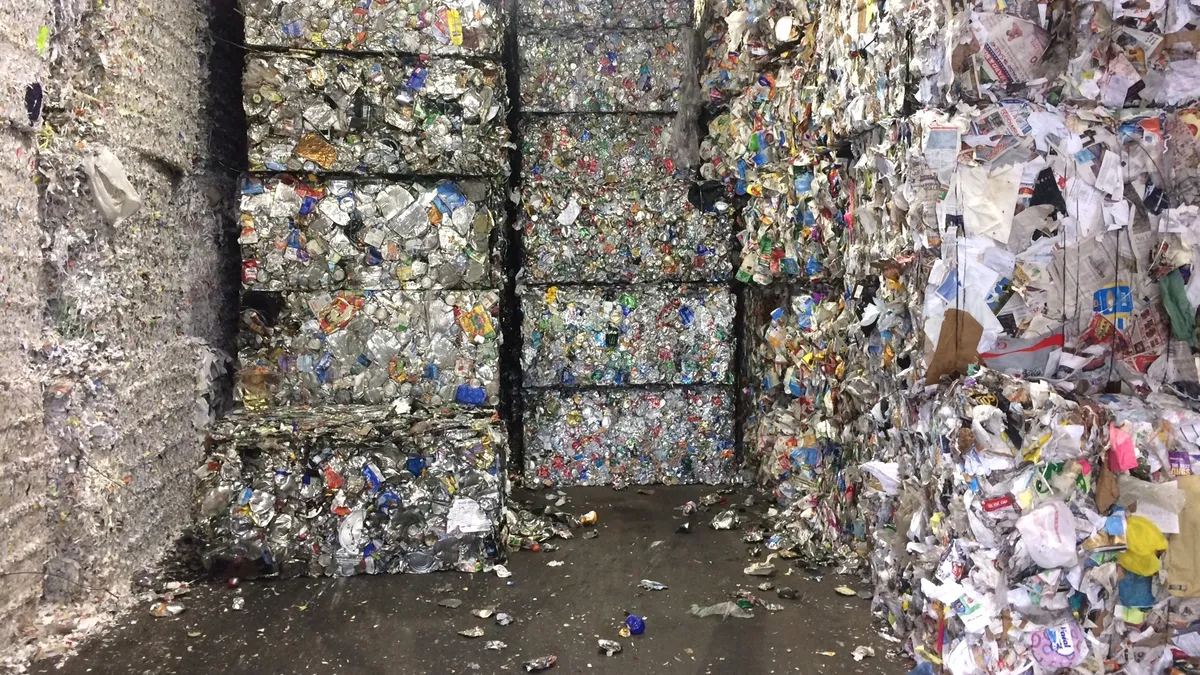UPDATE: Aug. 22, 2019: The Metro Waste Authority board approved plans Wednesday to move ahead with the construction of a single-stream MRF in the Des Moines, Iowa area, as reported by KCCI.
According to the board's agenda, a nearly $10.9 million contract will be awarded to CP Group to provide equipment for a facility that can handle up to 25 tons per hour, or 45,000 tons annually. As requested by the board, CP's bid also includes an option to expand to 60,000 tons in the future at a cost of more than $2 million. Bids were also received from Bulk Handling Systems, Machinex and Van Dyk Recycling Solutions.
Dive Brief:
- Iowa's Metro Waste Authority (MWA), plans to issue an RFP for the construction and start-up of its own municipal MRF. The move comes after MWA conducted a feasibility study and toured multiple facilities amid global market challenges.
- The RFP will seek recycling equipment manufacturers who can design, build and install an automated single-stream sorting system. According to preliminary estimates, the project will cost around $24 million, reports WHO TV.
- MWA material is currently processed by Mid America Recycling in Des Moines, under a contract that expires in 2021. Mid America Recycling reportedly said it would invest $5-10 million in new equipment if the contract is extended.
Dive Insight:
The 50-year-old MWA represents 16 member communities, including Des Moines, along with Polk County. The entity currently manages multiple landfills and other facilities, but does not have its own MRF. The Mid America MRF that MWA contracts with is the largest in the state. Mid America Recycling bought it from Waste Management in 2015 and took over operations.
In December, the Des Moines Register reported that Mid America had been landfilling up to 20 tons of paper a day for four months last summer. The company said it had encountered the same difficulty with finding material buyers as other processors since China's scrap import restrictions took effect. The Register also reported that market difficulty had led to higher costs for Des Moines, with a fiscal deficit projected to reach $50,000 this year, and rate increases could be necessary for residents in the future.
The MWA board of directors has reportedly been discussing challenges with recycling since 2016. It launched the MRF feasibility study because of a continued commitment to offering Des Moines and neighboring member residents a cost-effective recycling program. MWA representatives have noted publicly that the region needs a state-of-the art MRF because today's materials cannot be efficiently and cost-effectively processed with old equipment. Optical sorters are one of the equipment upgrades MWA reportedly investigated, although Mid America Recycling says its MRF already has optical sorters.
Cutting out the middle man and investing in a new MRF is an interesting tactic at a time when a number of local governments are struggling to keep their recycling programs financially viable. MWA appears to have determined that the long-term return on investment will outweigh upfront costs, especially when compared to an increasingly expensive alternative with Mid America Recycling.
Following staff recommendations, the MWA board will have to approve any winning bidder for the RFP at a future meeting.















